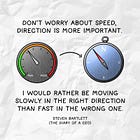Work Hard; Get Smart
My Change of Opinion
Welcome to Polymathic Being, a place to explore counterintuitive insights across multiple domains. These essays explore common topics from different perspectives and disciplines to uncover unique insights and solutions.
Today's topic challenges that adage “Work smarter, not harder.” Let’s explore why that idea isn’t wrong, per se, but incomplete, especially when advising the younger generation on how they can be successful. Work Hard; Get Smart changed my perspective and compelled me to reevaluate my approach to being smart.
Intro
On a recent Lex Friedman Podcast, Michael Paulson discussed how much he hates the phrase “Work smarter, not harder.” As a fan of that phrase, I could feel my brain starting to get triggered. I anticipated he’d say something along the lines of the normal cliches like "hard work pays off," "no pain, no gain," and "what doesn’t kill you makes you stronger.” You know, the normal drivel that drives me nuts.
However, I was wrong. It’s a great discussion and forced me to rethink my own biases and realize that I was overlooking something that I actually found value in. To quote Mr. Paulson:
The reason why I dislike that is that there is kind of a hidden suggestion there, which is that you already know what smarter is, so just do that. That actually things should be easy. You should just not have to try that hard. You should just do the quick, easy, obvious path and boom, it’s done.
It’s like I’ve never experienced that in anything I’ve done. Everything is actually really hard and most of the time I don’t even know what I’m doing, so therefore I don’t even know what smart looks like. And so for me, the only way I can learn how to work smart is by working very, very hard and knowing that there’s no shortcuts. And then when I finally figure out what smart is, when I work smart and work hard, it is that much better.
Now, you might be raising your eyebrows because I have written a lot about working smarter, not harder. Hell, I advocate for Lazy Leadership:
And I recommend that people Quiet Quit:
But these are insights I’ve gained after years of experience and a lot of failures. In fact, they’re probably not the best advice to give even to myself 20 years ago. That’s because so many lessons I learned about how to work smart were, as Mr. Paulson says, the result of working hard.
And I have worked hard throughout my career. I’ve done everything from manual labor cleaning toilets to teaching college. I’ve often had more than one job at a time. One summer, between college terms, I worked 16 hr days, slept out in the woods, and bathed at a local state park. I’ve been in the Army, humping 150lbs of gear through the mountains at 3 AM. I’ve knuckled down and dealt with toxic leadership while busting my butt just to survive. I’ve earned my hard work stripes.
I also didn’t join the workforce knowing how to work smart. I did pay attention and learn from a lot of very smart workers. I was taught tons of tricks for building houses that made things faster and easier. I was taught how to read tables as a waiter to make better tips. I have a shelf of leadership books I’ve read through, learned from (both what to do and what not to do), and I’ve studied and learned from those around me.
Additionally, because I worked hard, leaned in, took on tough tasks, and was motivated, I had numerous mentors who helped me out, provided top cover, and showed me what success really looked like. I worked hard, and people respected that and helped me get smart because I was also willing to learn.
This is something J. Daniel Sawyer discusses in how a lot of the rules we share with the younger generation work until they need to be broken. Working hard requires learning the rules. Working smart means learning when to break the rules.
Advice For Younger Me
So what would I tell younger me? These essays still work as insights for the younger generation. They’re lessons into what I’ve learned, and I share them freely because others have done the same for me. Telling younger me to work smarter, not harder, didn’t work. However, if I had been told “Work hard; get smart,” it would have made a lot more sense, and I’d only caveat this with the Ranger adage, “Slow is smooth and smooth is fast.”
That’s because hard work should never result in worthless work. Industriousness, as we learned in Lazy Leadership, needs to be combined with smarts, where you are constantly keeping your head up, looking around, comparing, learning, and ensuring you’re headed towards the targets you want to hit. Working hard isn’t just working hard. It’s working hard to get smart.
What are the times you’ve worked hard and gotten smart? What times have you worked hard and realized you needed to work smarter?
Did you enjoy this post? If so, please hit the ❤️ button above or below. This will help more people discover Substacks like this one, which is great. Also, please share here or in your network to help us grow.
Polymathic Being is a reader-supported publication. Becoming a paid member keeps these essays open for everyone. Hurry and grab 20% off an annual subscription. That’s $24 a year or $2 a month. It’s just 50¢ an essay and makes a big difference.
Further Reading from Authors I Appreciate
I highly recommend the following Substacks for their great content and complementary explorations of topics that Polymathic Being shares.
Goatfury Writes All-around great daily essays
Never Stop Learning Insightful Life Tips and Tricks
Cyborgs Writing Highly useful insights into using AI for writing
Educating AI Integrating AI into education
Socratic State of Mind Powerful insights to the philosophy of agency









I’m not sure I agree wholly with Sam. I think working hard will get you to 70 maybe 80 percent. Getting to smart and the 80-100% requires creativity and creativity requires insight and insight requires time to reflect and analyze. If you’re working long hours, it’s hard if not possible to be able to step back and evaluate how to work smarter. You need those walks in the woods or those long showers.
Excellent article. Reminds me of what Sam Atman wrote in a blog post.
“You can get to about the 90th percentile in your field by working either smart or hard, which is still a great accomplishment. But getting to the 99th percentile requires both—you will be competing with other very talented people who will have great ideas and be willing to work a lot.”